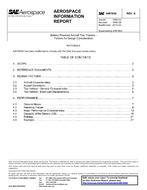Click here to purchase
The recommendations of this document apply to such aircraft as are able to perform both normal angle and steep IMC approaches, the latter being defined as those approaches having a final approach segment angle greater than 4\mD. Such aircraft can include both conventional and STOL fixed-wing aircraft, commercial air transport and/or utility and normal category helicopters, compound helicopters and powered lift vehicles (tiltrotors, tiltfans, tiltwings, etc.).The purpose of this document is to set forth the recommendations of SAE Committee G-10 Vertical Flight Subcommittee relative to the location, control, and implementation of electronic flight information systems, primary flight displays, secondary (standby flight) displays, engine and instruments displays, crew alert displays and associated required flight deck/cockpit displays. These recommendations are intended to derive intuitive and easily interpretable displays and display locations to minimize confusion, distraction and fatigue, thereby reducing crew workload and increasing crew performance, efficiency, safety and reducing factors detrimental to flight safety. In arriving at these recommendations the committee carefully reviewed the layouts of modern commercial and military aircraft, developmental tiltrotor flight deck/cockpit layouts, the recommendations and requirements of the Federal Aviation Administration Aircraft Certification branch and the requirements of commercial operators and aircraft manufacturers. In cases where conflicting opinions existed, suitable compromises were made.This document applies to all electronic flight instrument display systems, including but not limited to liquid crystal displays (LCD), field emitting diodes (FED), light emitting diodes (LED) or cathode ray tube (CRT) technology.
Product Details
- Published:
- 01/15/2013
- File Size:
- 1 file , 1.1 MB


